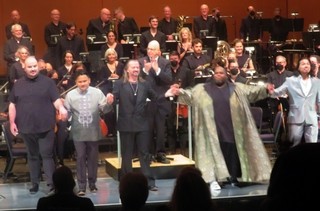|
Back
An Apotheosis of Evil Albany
Annandale-on-Hudson (Sosnoff Theater, Fischer Center)
08/07/2022 -
Sergei Rachmaninoff: Symphony No. 1 in D minor, Opus 13 – The Miserly Knight, Opus 24
Nathan Berg (Baron), Limmie Pulliam (Albert), Ethan Vincent (Duke), Rodel Rosell (Moneylender), Matthew Anchel (Servant)
American Symphony Orchestra, Leon Botstein (Conductor & Music Director)
Jordan Fein (Director), Joshua Thorson (Video Design)

M. Anchel, R. Rosell, E. Vincent, L. Botstein, L. Pulliam, N. Berg (© Samuel A. Dog)
“Vengeance is mine, I will repay, saith the Lord”
Epigraph to score of Rachmaninoff First Symphony from Romans 12.19
Say an exultant Ave atque vale to the Rachmaninoff of the Paganini Variations or the Second Piano Concerto and Second Symphony. As part of Leon Botstein’s exhaustive “Rachmaninoff and his World”, an opera was uninterred that, for sheer vileness of theme, repulsiveness of character and brassy musical turbulence–could rival Mussorgsky at his perverted best. Or worst. Take your choice.
With words from a short story by Alexander Pushkin, Rachmaninoff’s The Miserly Knight is one of the two rare operas of Bard’s Summerscape. The Silent Woman was Richard Strauss with a sense of humor. But Rachmaninoff’s The Miserly Knight was sheer misanthropy. And for one long monologue alone–a long exposition on the glory of miserly gold–this was a masterpiece.
Why has nobody chosen to stage this masterpiece? First, a one‑hour opera is hardly fashionable (though it could easily be paired with, say, Menotti’s The Medium). Second, not a female is anywhere on stage. Third, if this is a chamber opera, it takes an orchestra the size of Botstein’s American Symphony to do it justice. Third, the “moneylender” is a Dickensian Third Reich picture of the avaricious Jew.
(Hey, as Botstein said in his introduction, this was 18th Century Russia, not the Upper West Side.)
Yet the Jewish moneylender–who offers poison to a wastrel Albert to kill his father–is no worse than the miserly father, then his despicable son or a crafty Duke egging on the father to a duel and death.
Within its one‑hour scope, Rachmaninoff presented Pushkin’s story, word for word, each character exclaiming in monologues verging on song, themselves on the cusp of fierce Dostoyevskyan raging.
Yet where the father revels in his gold (a separate scene), both Pushkin and Rachmaninoff outdo themselves. Yes, we speak of Lulu and Wozzeck for 20th Century tragedy. But this scene, pronounced with full‑bodied lyricism and theatrical hysteria by Nathan Berg, with the brass and Dies Irae style orchestra is as mesmerizing as anything produced by Alban Berg.
By the end of the 20‑minute soliloquy, the musical feeling resembles an epileptic Mussorgsky with poisonous words by Alex Jones. One of the great scenes in opera.
Musical director Leon Botstein has chosen his whole cast for drama Slavic-style histrionics. The son, tenor Lillie Pulliam, keeps his voice to the lower register, but from the start, describing a fight, to his whining imprecation to the Jewish moneylender, is full‑bodied, resonant, dramatic. Rodel Rosell has the advantage of great writing, his one scene sniveling, warning, obsequious and finally villainous offering poison to the son.
In the final scene, the Duke, Ethan Vincent, is in fine voice. But the greatness is in Pushkin’s writing as the man goes from friendship to challenge to death.
The staging was symbolic. Yes, a translation was on the back screen. But along with that were HUGE letters spelling out the themes of avarice and revenge, villainy and horror. Most important. Mr. Botstein kept the American Symphony Orchestra almost overflowing the stage proscenium with trumpets and horns, trombones and tympani (easily overwhelming the strings and winds.)
The word blood-curdling is usually used for Poe, King or the Hammer movies of the 1950’s, but The Miserly Knight had, for this listener curdled the blood–with dramatic music rarely found in the Russian’s symphonic works.
Including the first piece of the afternoon, Rachmaninoff’s First Symphony. It had been a terrible failure at its premiere (as Mr. Botstein explained, much due to the conducting of the alcoholic Glazunov). And true, the music has its longueurs but was well as its melodic inspiration. But the trumpet-snare drum finale would make the 1812 Overture sound like a lullaby.
By the way, this month‑long tribute to Rachmaninoff is a month‑long masterpiece. Not only of the composer but his Russian contemporaries (was drunkard Glazunov purposely omitted?), his American colleagues from Gershwin to Cowell, and his influences both for keyboard, voice and orchestra.
Add to this an 80‑page program of history, pictures and esoterica, going to the top of my own library. Alas, Bard College is a two-and-a-half-hour bus ride from New York. Otherwise, this writer and many others, would camp out on the Bard College massive sward to hear more and more and more. Growing up to Mahler and Schoenberg, I quietly sneered at the name Rachmaninoff. This month, the many sides, emotions and–above all–inspirations have given him not only resurrection but life‑giving inspiration.
Harry Rolnick
|